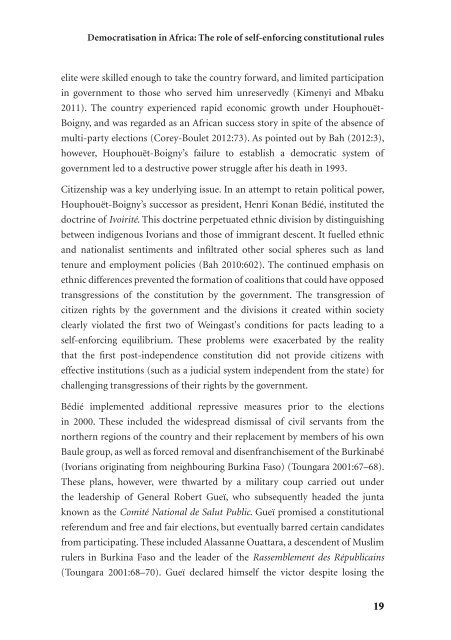ACCORD-ajcr-2015-1
ACCORD-ajcr-2015-1
ACCORD-ajcr-2015-1
- No tags were found...
Create successful ePaper yourself
Turn your PDF publications into a flip-book with our unique Google optimized e-Paper software.
Democratisation in Africa: The role of self-enforcing constitutional rules<br />
elite were skilled enough to take the country forward, and limited participation<br />
in government to those who served him unreservedly (Kimenyi and Mbaku<br />
2011). The country experienced rapid economic growth under Houphouët-<br />
Boigny, and was regarded as an African success story in spite of the absence of<br />
multi-party elections (Corey-Boulet 2012:73). As pointed out by Bah (2012:3),<br />
however, Houphouët-Boigny’s failure to establish a democratic system of<br />
government led to a destructive power struggle after his death in 1993.<br />
Citizenship was a key underlying issue. In an attempt to retain political power,<br />
Houphouët-Boigny’s successor as president, Henri Konan Bédié, instituted the<br />
doctrine of Ivoirité. This doctrine perpetuated ethnic division by distinguishing<br />
between indigenous Ivorians and those of immigrant descent. It fuelled ethnic<br />
and nationalist sentiments and infiltrated other social spheres such as land<br />
tenure and employment policies (Bah 2010:602). The continued emphasis on<br />
ethnic differences prevented the formation of coalitions that could have opposed<br />
transgressions of the constitution by the government. The transgression of<br />
citizen rights by the government and the divisions it created within society<br />
clearly violated the first two of Weingast's conditions for pacts leading to a<br />
self-enforcing equilibrium. These problems were exacerbated by the reality<br />
that the first post-independence constitution did not provide citizens with<br />
effective institutions (such as a judicial system independent from the state) for<br />
challenging transgressions of their rights by the government.<br />
Bédié implemented additional repressive measures prior to the elections<br />
in 2000. These included the widespread dismissal of civil servants from the<br />
northern regions of the country and their replacement by members of his own<br />
Baule group, as well as forced removal and disenfranchisement of the Burkinabé<br />
(Ivorians originating from neighbouring Burkina Faso) (Toungara 2001:67–68).<br />
These plans, however, were thwarted by a military coup carried out under<br />
the leadership of General Robert Gueï, who subsequently headed the junta<br />
known as the Comité National de Salut Public. Gueï promised a constitutional<br />
referendum and free and fair elections, but eventually barred certain candidates<br />
from participating. These included Alassanne Ouattara, a descendent of Muslim<br />
rulers in Burkina Faso and the leader of the Rassemblement des Républicains<br />
(Toungara 2001:68–70). Gueï declared himself the victor despite losing the<br />
19


